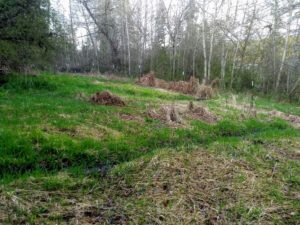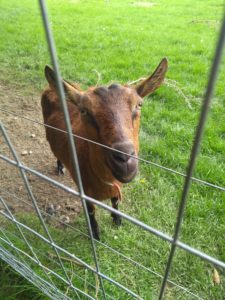So what is Birch Hill? It’s actually the name of the farm that I live on. It was founded sometime around 1903, and was referred to by name on the county maps. It was named after the Birch trees that grow on the hill behind the farmhouse, which thrive in the damp soil, watered by artesian springs. The original farmer raised shorthorn cattle, American Berkeshire pigs, and bottled the water from the springs at the top of the property.

Here are some of the Birch trees up on the hillside. I can understand why the farmer chose to name his farm after them. It seemed like a nice name for a publishing company as well.
Why start a publishing company? When I was younger I worked for a couple of publishing startups that ultimately went out of business. Later on, I had a chance to work for a major publisher. I also worked for a while as a teacher, and for a tech startup involved in mobile app and ebook development. Through all of this I had the opportunity to learn a wide variety of skills related to publishing. I realized at a certain point that I knew how to do just about everything involved in creating a book from start to finish. I was much better at some of the tasks than others, but I could ultimately do everything up to professional standards.
I had been interested in translation my entire life, but many of the projects that I was most wanted to work on were not ones that are commercially viable for a large publisher to undertake. They may ultimately generate some revenue, but probably not enough to make up the fixed costs that large publishing operations have.
I, on the other hand, can choose to take on these sorts of “pet” projects. I don’t have any fixed costs, and, in the end, my motives for working on these projects are not purely financial.
My goal is to provide modern translations of the 19th and early 20th century European genre fiction. These are books that I enjoyed reading when I was younger in older translations, and then again later in the original languages. In all of these cases, I felt like I was reading a different book when I read the original. This doesn’t have to be the case. A well-done, modern translation can provide a reader with the sense and the feeling of the original writing, but rendered into their own language.
I’ve started with Jules Verne, because he’s a favorite of mine, and some of his lesser-known novels in particular have suffered from very poor English translations. I’ll probably stick with him for a while, but I would like to branch out eventually into works by other authors such as Swiss Family Robinson.
Lastly, you might be wondering — is the farm still a farm? Yes, it is, though more of a hobby farm now. We grow apples, raspberries, blackberries, currants, and gooseberries, and have ducks, chickens, and dairy goats. Here’s an obligatory cute goat picture to finish things off.
